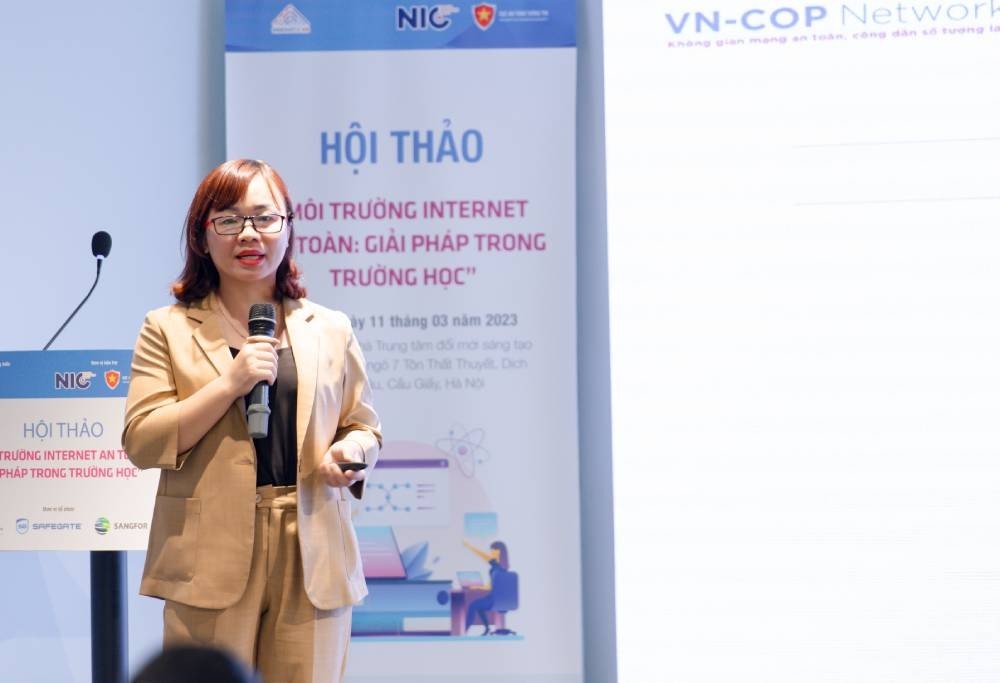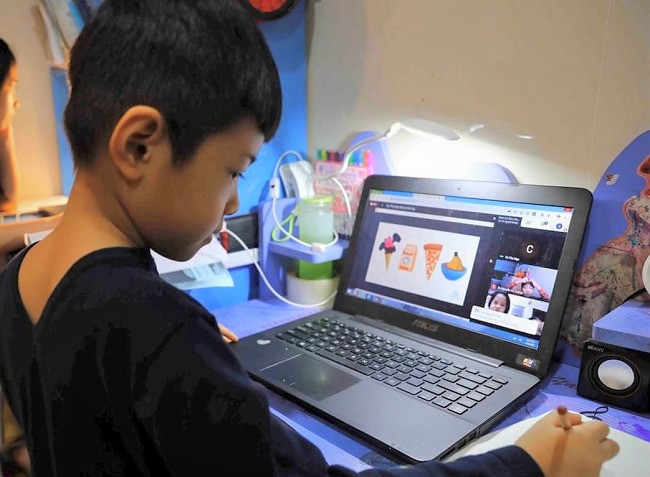
Warnings on potential risks of Artificial Intelligence (AI) for children: Expert
Latest
 |
| Warnings on potential risks of Artificial Intelligence for children: Ms. Dinh Thi Nhu Hoa said that applications of integrating AI are becoming increasingly popular and have a significant impact on children. (Photo: Courtesy) |
There are certain risks when children depend on AI
In recent times, applications integrating AI have become increasingly popular. Among them, some children are vulnerable to being hurt by AI tools. Do you have any warnings about this issue?
Currently, applications of integrating AI are becoming increasingly popular and are shared and used by many people. Some typical activities among them are photo editing applications, chat applications (chatbots)... However, many people have forgotten that subjects are susceptible to AI tools, with long-term consequences are children. Children of all ages have easy access to AI tools, but these tools have almost no commitment to users.
Nowadays, children have easy access to AI tools but there are almost no requirements before using them. How do you assess the risks that children face?
According to statistics, the rate of children using the Internet between the ages of 12 and 17 is very high, accounting for 93% in urban areas and 88% in rural areas. In particular, 98% of children access the internet through smartphones.
In my opinion, there are a number of risks of AI that impact children. First, the risk of accessing inappropriate information. Information from AI-integrated applications such as ChatGPT provided to users is information compiled from many sources on the Internet. This includes both accurate and inaccurate information. Even this information is not selected, evaluated, or screened according to the user's age. As a result, searches may display misinformation, inappropriate or violent content.
Second, the risk of spreading private information and leaking children's personal information. Children unintentionally share personal information online, easily becoming victims of illegal data intrusion when using photo editing applications and chat applications (chatbots).
Third, is to entice and seduce children to participate in dangerous challenges. In fact, there have been alarming cases of teenage girls consulting ChatGPT for health information and diet plans. AI can quickly provide information with detailed plans and specific advice. However, this information does not reference any actual data, but is just random collections of information online.
At the same time, when exposed to Chatbots from a young age, children will mistake AI for a real friend and act according to AI's advice. Meanwhile, these tips may include biased, inaccurate, harmful or misleading content.
Fourth, it is the impact on children's psychology, physiology and behavior. With the help of AI tools, users can find information about any topic with just one question. AI chatbots have made it easier to navigate information without having to open dozens of different websites and read countless articles to synthesize information.
Thus, interacting too much with technology can lead to depression, anxiety or loss of social skills due to less and less interaction with others. Besides, children's over-reliance on AI reduces their ability to learn and work proactively.
Guiding children to behave online in a civilized and kind manner
In your opinion, what is the sustainable solution to minimize the consequences that AI tools can have on children?
According to UNICEF's 2022 report, 23% of children said they sometimes accidentally see sensitive images or videos advertised online. In fact, pornography is everywhere, so blocking pornographic websites is insufficient and ineffective. Children need a powerful, effective tool to block and filter online content, helping them avoid being "exposed" to bad and toxic information.
 |
| Guiding children to comply with the Internet usage rules set by the service provider, school and family. (Photo: dangcongsan.vn/DT) |
To minimize the risks of AI affecting children, we do not have to ban children from using it, but most importantly, educate children to raise their awareness to recognize risks and protect themselves in the online environment. In my opinion, there are some principles that might help children stay safe onlinrise, which are Compliance - Smart - Cautious and Kind.
Firstly, guiding children to comply with the Internet usage rules set by the service provider, school and family. Legal compliance such as following community rules that some AI applications is not intended for children under 13 years of age.
Second, equip children with knowledge and skills to participate in a smart online environment such as skills to provide personal information on the network environment, skills to use social networks safely, and manage passwords to ensure safety.
Third, instruct children to be careful with online friends because there may be people impersonating them to approach children, be careful when accessing strange links, and be careful when encountering attractive offers. Unbelievable, be careful when providing information online, including chatboxes, to minimize risks related to online fraud. Finally, it is necessary to guide children to behave civilly and kindly in the online environment, not to send or respond to messages with bad or offensive content.
How can parents be cyber “gatekeepers” for their children?
Parents can apply a number of technology tools to help block and filter inappropriate information for children such as Cyberpurify kid, safe gate family, BKAV safe kid, mobile guard for kid, safe zone, etc.
In addition, parents also need to set rules about using computers and network devices for their children. For each age, the rules are different. Parents only let their children use social networks when they are old enough to use them according to the recommended community principles of social networking platforms.
In particular, parents need to always pay close attention to the online content that their children are accessing in cyberspace. Parents need to equip family information security solutions such as anti-malware and anti-virus software, solutions to block and filter bad information, products to monitor and prevent harmful information, when children access the Internet.
| Vietnam and ASEAN countries agreed to adopt the Declaration on the Protection of Children from all Forms of Online Exploitation and Abuse in ASEAN in 2019; and the Declaration on the Elimination of Bullying of Children, including bullying children online, in ASEAN, in 2021. |













